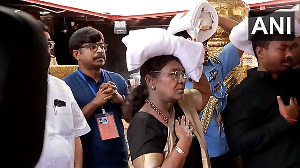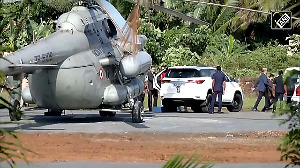So it wasn't a case of being third time lucky. Another attempt at concluding the 'Doha Round' of negotiations aimed at liberalizing world trade, particularly in agricultural goods, collapsed yet again.
For a while it seemed as if World Trade Organisation Director General Pascal Lamy's proposals of July 25, because they led to some forward movement, might do the trick. Sweeteners had been added -- the European Union and the United States of America had offered to consider more temporary work visas for skilled professionals, something that has been a long-standing Indian demand.
Special deals with individual countries with specific interests were being struck -- divide and rule at its best.
But suddenly China and India dug in their heels and accusations began flying thick and fast. After the collapse, there has been no shortage of rhetoric: The US blames China and India for being 'overly protective;' China says that the US was 'asking a price as high as heaven;' and India says that while the US was 'looking at enhancing its commercial interests' India was 'looking at protecting the livelihood of farmers.'
But for once there might be substance to rhetoric. For a while when it looked as if there was a reasonable probability that a deal might be done, it was clearly going to be at the expense of policy space in agriculture. India's farmers, the G-33 and developing countries -- with a defensive interest in agriculture -- must have heaved a huge sigh of relief.
Policy space: Special Products and Special Safeguard Mechanisms
At the heart of addressing livelihood concerns of small farmers in developing countries in the on-going Doha round of WTO negotiations is the designation of Special Products (SPs) and Special Safeguard Mechanisms (SSM) in the Agreement on Agriculture.
Developing countries have argued that SPs -- products linked to food security and livelihood security -- should either be subject to no tariffs or small reductions. An SSM would allow a temporary increase of relevant tariffs in response to a pre-specified increase in import volumes or decline in price levels.
In designing the use of both these instruments, the G33 and other developing country groupings in the WTO have sought to amplify the policy space available to developing countries in dealing with livelihood concerns while continuing to integrate into the global economy.
The reason for framing livelihood issues in this manner is the understanding that small and marginal farmers, at least in most developing countries -- including India -- lead an exceedingly precarious economic existence and are not positioned to compete effectively in relatively open agricultural markets, particularly given the levels of subsidies enjoyed by agricultural producers in developed countries.
Therefore, in a situation where reasonable opportunities of migrating out of agriculture are limited even in rapidly growing economies, forcing farmers off their land through import competition is both economically and politically unsustainable.
Second, given the above, the flexibilities sought in the use of instruments have to be put in the context of the seriously limited policy space currently available to developing countries in helping small and marginal farmers cope with import competition, given that direct production subsidies of various sorts are WTO-illegal.
Negotiations around policy space
Crawford Falconer's initial negotiating text for the Agreement on Agriculture made a mockery of livelihood concerns of small farmers that is at the heart of the developing country and Indian position. It offered that the SSM be activated if prices decline by 30 per cent or more and far fewer SPs than the G33 have asked for.
Little wonder then that India had said that the new text is 'totally unacceptable.' Perhaps, much more pointedly, the Small and Vulnerable Economies Group, commenting on Falconer's draft text noted, among other things that as far as the SSM is concerned, "lamentably the text is very far from reflecting a possible agreement, because the dispositions contained therein turn it into a mechanism without utility for the developing countries." (Translation mine)
After extensive consultations with WTO member countries and official groupings, Falconer released a revised draft in early July. Whereas there was some movement in some areas, on SPs and SSMs there was practically none.
"The G-33 would make it clear, that the specific architecture, elements and figures of SPs & SSM suggested in the draft text, are unacceptable . . . clear that continued and unbalanced attempts are being made to make the SSM difficult and burdensome to operate, ineffective and meaningless. It is indeed another major disappointment for the Group."
India while supporting the G33 statement added that 'without full comfort on both these measures, developing countries would obviously be hard pressed to show flexibility in other areas of the negotiations.' And that where matters stood until the Lamy proposals of July 25.
Under the Lamy proposals there was some forward movement on SPs, but the price trigger for the SSM had been set at 40 per cent, even higher than in Crawford's initial negotiating draft.
And it is this to which India and other developing countries, with defensive interests in agriculture, have so vehemently objected. Given that developed countries have agreed to the SSM, the 40 per cent is more than likely not a negotiating ploy. But in pitching it at 40 per cent, developed countries had indicated that they would like to settle not far from 30 per cent, as suggested in Crawford's initial draft.
In the process, as the G33 has noted 'make the SSM difficult and burdensome to operate, ineffective and meaningless' and de facto deny developing countries the policy space within which to address the livelihood concerns of developing countries and their farmers.
The right to say 'no'
At issue here is the nature of the agricultural modernisation programme that countries are being told to undertake. But as I, amongst others, have argued elsewhere, agricultural modernisation does not necessarily have to be at the expense of small and marginal farmers.
It is possible and feasible to have a modernisation strategy centered on small-farmers. Co-operative and/or public sector-driven investment in market intermediation infrastructure -- credit, extension, input-purchase, storage, trading, marketing, and insurance -- would ensure that small farmers are both profitable and productive.
Equally importantly, this strategy would address concerns about food-security, livelihood security, environmental conservation and sustainable growth. Therefore, one part of the solution to the problem of food-security and sustainable growth is in the hands of 450 million small and marginal farmers (globally) who otherwise would have been the target of unfair import competition.
For most developing countries, including India, however, even today agriculture and allied activities account for more than 50 per cent of their workforce. Therefore an agricultural modernisation programme that does not take into account the needs of small and marginal farmers and agricultural labour would not only be economically, but also politically, unsustainable.
Equally, it is important to remember that 95 per cent of the world's small and marginal farmers live in poor, developing countries and that 75 per cent of the world's poor survive on agriculture.
For developing countries, therefore, the key to both food security and livelihood security is the ability to protect small and marginal farmers from unfair competition and the policy space within which they can develop an agricultural policy centered on small-farmers and the maximisation of employment growth.
Therefore, once again, China, India and other developing countries with defensive interests in agriculture held firm and, despite the threats and blandishments and the nature of other deals that might be cut, said clearly that policy space in agriculture is not tradable.
It was right to say 'no'.
The author is an Assistant Professor of Economics at the Indian Institute of Management Calcutta (IIM Calcutta) in Kolkata. He can be reached at mritiunjoy@iimcal.ac.in
- India and the WTO: News & Issues
- By the same author: Why criticising the Rs 1-lakh car is wrong





